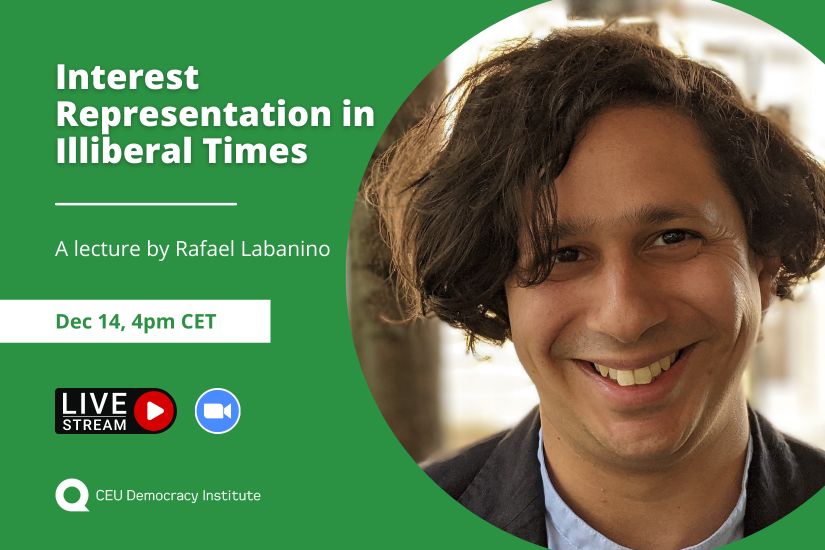
The De-/Re-Democratization Workgroup of the CEU Democracy Institute cordially invites you to this lecture on how the closure of the political opportunity structure affects interest group access to policy makers in Czechia, Hungary, Poland, and Slovenia.
How does democratic backsliding affect interest representation and intermediation? Surprisingly, searching for such studies on Google Scholar will not lead to many relevant hits if any. Indeed, interest organisation and lobbying research based even today mostly on North American and Western European cases is all too focused on the organisational level in explaining interest groups access to policy makers and their influence realisation. The presentation fills in this research gap. The analysis conducted on a sample of interest groups active at the national level in three policy domains across four Central and Eastern European EU member states reveals that the political process influences access: the relative importance of the legislature for interest groups and the level of legislative fractionalisation affect access positively, while the closure of deliberative structures has a negative effect. Nevertheless, the political contextual factors are mediated through variables both at the population and organisational levels, as well as interorganisational cooperation.
The study is part of joint project of the University of Konstanz, Germany and the University of Opole, Poland, ‘The “Missing Link”: Examining organized interests in post-communist policy-making’. The research project, which concludes this December, combines the organizational counts of national level Czech, Hungarian, Polish, and Slovenian energy policy, healthcare, and higher education interest group populations with a comparative survey carried out in 2019-2020 in the four countries simultaneously.
The lecture will also briefly discuss other studies of our research agenda that provide context to the presented quantitative analysis.
To receive the Zoom-link, please register here.*
About the speaker:
 Rafael Labanino is a political scientist, he graduated at the Eötvös Loránd University and the Central European University, Budapest. Between 2011 and 2016, he was a research fellow at the University of Bern, where he participated in the creation of the Liberalisation Database 1973-2013, which is a systematic compilation of liberalising and de-liberalising reforms in 37 advanced capitalist democracies across 12 social and economic policy fields. Since 2018 he is a research fellow in the project “The Missing Link: Examining organised interests in post-communist policy-making” first at the Goethe University, Frankfirt am Main and since September 2019 at University of Konstanz. Since 2019 he is also a research fellow at the Institute of Biology, Ludwigsburg University of Education, where he develops educational indicators His main areas of research include social policy, social dialogue, higher education policy, democratisation, and interest group politics in Central and Eastern Europe, as well as education for sustainable development in the German school system.
Rafael Labanino is a political scientist, he graduated at the Eötvös Loránd University and the Central European University, Budapest. Between 2011 and 2016, he was a research fellow at the University of Bern, where he participated in the creation of the Liberalisation Database 1973-2013, which is a systematic compilation of liberalising and de-liberalising reforms in 37 advanced capitalist democracies across 12 social and economic policy fields. Since 2018 he is a research fellow in the project “The Missing Link: Examining organised interests in post-communist policy-making” first at the Goethe University, Frankfirt am Main and since September 2019 at University of Konstanz. Since 2019 he is also a research fellow at the Institute of Biology, Ludwigsburg University of Education, where he develops educational indicators His main areas of research include social policy, social dialogue, higher education policy, democratisation, and interest group politics in Central and Eastern Europe, as well as education for sustainable development in the German school system.
* Please note that the event will be recorded. The edited recording will be shared on YouTube. In case you ask questions during the Q&A sessions, your image and voice could appear in the stream and the video. By registering to the event, you give your explicit permission for your image and voice to be used in the video recording of the event shared online.
At Közép-európai Egyetem (address: 1051 Budapest, Nádor u. 9.) (“CEU” or the “University”) we place great emphasis on the protection of your personal information and compliance with the EU General Data Protection Regulation (GDPR). If you would like to learn more on how we use the personal data shared with us, please see our Privacy Notice here.